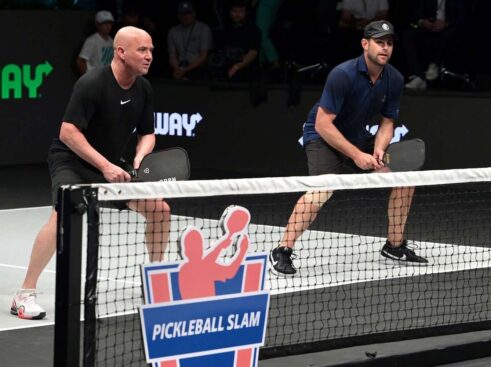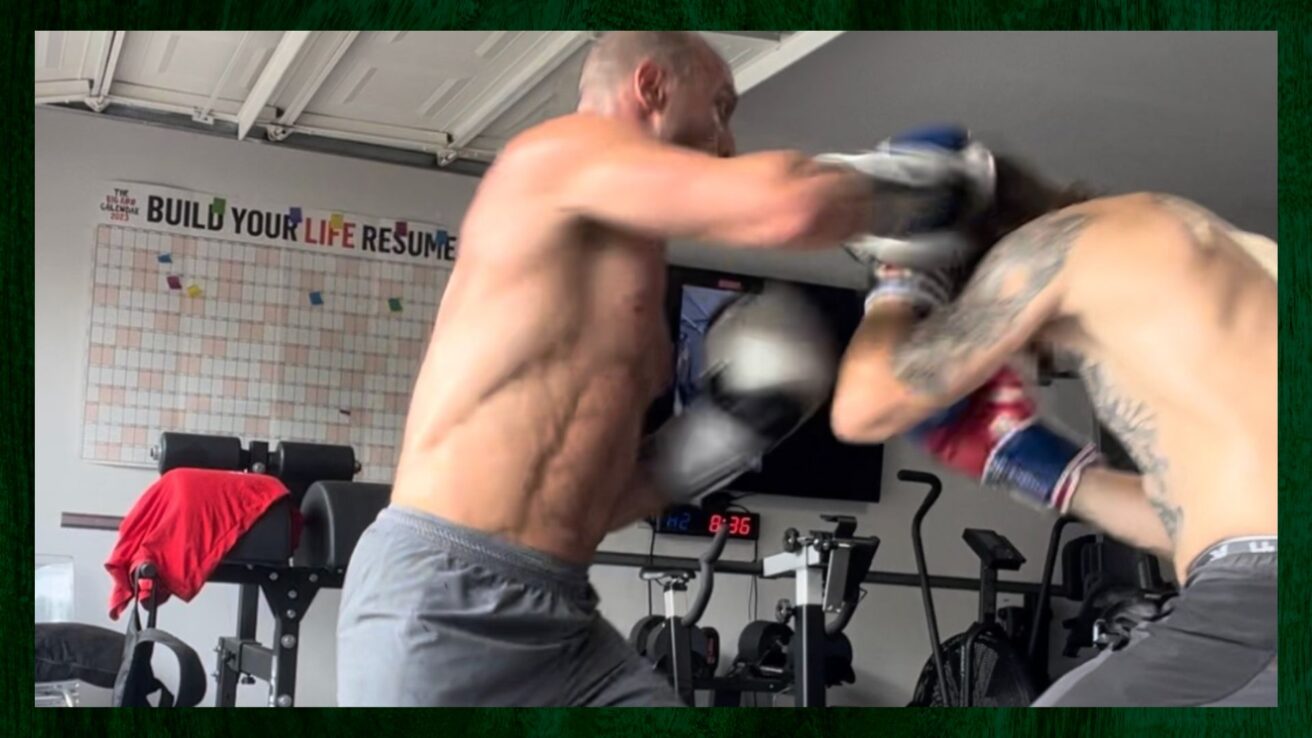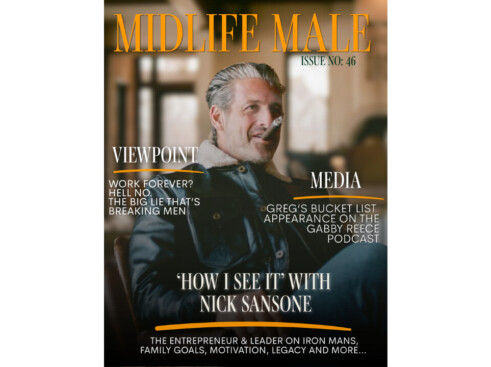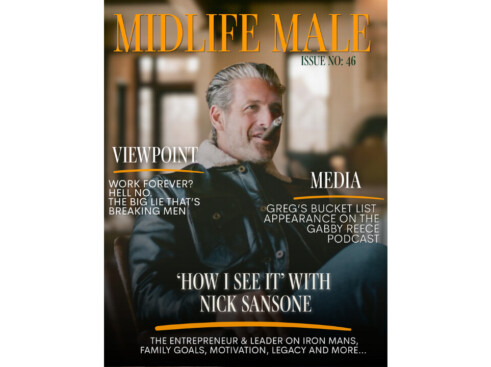The Midlife Male is a newsletter and podcast by Greg Scheinman sharing experiences on aging, success, personal growth, and navigating midlife. If someone forwarded you this newsletter, click here to sign up.
I haven’t written about mediocrity in a while, but current events make this an appropriate time to revisit the topic that is largely responsible for the creation of the Midlife Male movement. In fact, it was my personal acknowledgment that, at 47 years old, I was mediocre – and that I was no longer going to accept it – that kicked this whole MLM reinvention off.
This is why when I see mediocrity being accepted (or worse, endorsed) by individuals or even whole organizations, I feel compelled to call it out. After all, rejecting mediocrity completely changed my future, turning the dreaded (and false) “midlife crisis” narrative into the starting line for the best years of my life, where I’m happier, in better shape, more motivated and more content than I’ve ever been.
And here we are today; reeling from an event that seemingly puts the dangers of mediocrity on full display:
The recent assassination attempt on ex-President’s Donald Trump and the failure of the Secret Service to secure his safety and protection. Now, I’m not an expert on the topic of the military or snipers or protecting heads of state, but you don’t have to be any of those things to understand that there was a fundamental failure by an agency that is supposed to be among the best in the world. Even a casual review of the video surrounding the event will cause objective, common sense observers to notice some glaring errors: agents panicking, agents a foot shorter than Trump being used as human shields, clear sightlines to the former president and on-and-on.
The question is why did this happen? And how?
For that I turned to one of my favorite follows, ex-Special Forces sniper Tim Kennedy.
Kennedy posted this the other day:
Mediocrity Rears Its Ugly Head
After reading Kennedy’s post, his critique underscores the dangerous impact of conflating inclusion with competence and the mediocrity that can happen as a result. Statistics show that initiatives prioritizing diversity over capability can lead to decreased performance and increased risks. For example, a 2018 study by the Harvard Business Review found that diversity initiatives, when not coupled with competency-based hiring and promotion practices, often result in tokenism and resentment, which can hinder team performance and cohesion.
Moreover, in fields where safety and precision are paramount, like aviation and healthcare, affirmative action policies that lower standards can have catastrophic consequences. A 2017 report by the National Transportation Safety Board highlighted several incidents where less experienced pilots, hired to meet diversity quotas, were involved in avoidable accidents. Similarly, a 2019 study in the Journal of the American Medical Association found that surgical outcomes were significantly worse in hospitals where hiring practices emphasized diversity over merit.
These are scary conclusions to draw.
There’s also more work to do regarding the actual conversation of inclusion. In research published in the Harvard Business Review in 2021, 90% of responding firms said they were pleased with their DEI recruiting efforts, but when these teams were reviewing resumés, a woman or person of color needed the equivalent of a 4.0 GPA to be rated similarly to a white male candidate with a 3.75 GPA. We need to go beyond checklists, stop being afraid of having real conversations, and bring nuance back to both online and offline discussions.
Where do we go from here?
We must return to valuing capability above all else. This doesn’t mean we abandon efforts to create inclusive environments, but rather ensure that inclusion does not come at the expense of excellence. It’s about finding a balance where everyone has an equal opportunity to prove themselves based on their skills and performance.
What matters is whether you are capable. What matters is if you can do the job and outperform others based on measurable, quantifiable performance and requirements. What matters is that you are the best version of yourself.
Knowing the Limits
What matters most though is that even when you are doing everything you possibly can to transcend mediocrity and be that best version of yourself, that we all understand that our best may still not be good enough.
Despite all our efforts, we may not measure up, meet the necessary standard or lack the physical capabilities, education, skills and intangibles — especially when compared to others who may simply be more qualified and capable.
That’s life. And as we all know, life ain’t fair.
We experienced a sad day as a nation with the attempted assassination of former president and current nominee Donald Trump. Regardless of where you stand politically, I’m hopeful we can all agree that violence is not the answer.
What has been exposed is the galactically irresponsible acceptance of mediocrity under the auspices of equal opportunity, diversity and inclusion.
We have become so focused on equality, diversity, acceptance, complacency, and conformity that we have lost sight of the most crucial factor: capability.
Any, every and all positions should be based on one’s ability and capability to perform the role, regardless of one’s age, gender, orientation or race.
You don’t get to run the Secret Service because you’re a woman; you earn the privilege to serve in that role because you’re the most capable and best suited for the job. And you sure as shit shouldn’t be on protective detail if you’re not the most capable and qualified agent
I think where we’ve lost our way is by diluting this idea into the idea that the inclusive solution is more important than the capable solution.
(It’s tough to question this and invite rigorous debate without being painted as racist or sexist, so we often don’t. And then when very high-profile meltdowns like this happen the questioning becomes difficult to ignore. But part of not being mediocre as a man is not being afraid to say out loud what we’re thinking in our heads…Which also means not saying everything that pops into our heads either…And there’s the rub.)
I certainly don’t want the pilot of the commercial airliner I’ll be flying on this week to have been chosen because of their skin color or gender, but rather because they’re a best-in-class pilot and can land the plane safely.
We’re not seeing this in sports. Whether it’s Major League Baseball, the NFL, the NBA, or even the UFC, skill and performance are all that matters. Can you imagine the Yankees allocating a top draft slot for a diversity pick? It’d never happen in a million years. Quite frankly, it’s the opposite, they scour the world for the best players period. Their only focus is putting the best team on the field and winning a championship. Full stop.
This isn’t just about high-level positions; it’s evident in everyday businesses. Compare In-N-Out Burger to Whataburger or Chick-fil-A to KFC. In-N-Out Burger and Chick-fil-A excel because they hold their employees to higher standards. They’re all pulling from the same available pool and yet, some thrive while others are mediocre. The difference is in the selection, not the training. You can’t make a slow horse fast.
If you’re celebrating the inclusion of female Secret Service agents surrounding a president without considering their capability, you’re missing the point. The emphasis should be on performance, not gender or age.
Taylor Swift earns every penny because she puts forth an incredible performance. She’s literally best-in-class right now. Whether you enjoy her music or not (that’s a matter of taste, not capability), nobody can argue that she’s not a total pro.
When did this stop being the standard for the rest of the country? (And where have you stopped making this the standard for yourself in your own life?)
It’s time to focus on capability, not lowering standards for the sake of inclusivity. That’s the thing about standards. You either meet them… or you don’t. When we say our standards are rigorous, and yet nearly everyone is meeting them, perhaps we should consider that they’ve been set too low.
Standards should be uniform and based on performance. If the job requires that you be able to lift 100 pounds or be on your feet for 10 hours a day, then that’s the standard. We must respect our differences but also accept and respect qualifications and limitations.
The Secret Service, the military, the presidency, the role of a CEO, pilots… These are not places where we should be handing out participation trophies.
We must take ownership of the current trend of lowering standards. We created it, have enabled it and are now experiencing the consequences of it.
It’s our individual responsibility to be honest about our capabilities and limitations. Stop suing every company or organization that didn’t hire you, give you a chance or that did and you couldn’t measure up so they fired you.
Those who achieve their positions through lowered standards will always question their worth. True confidence comes from knowing you’ve earned your place through merit and performance. Anything less creates real imposter syndrome. That’s literally the definition of an imposter.
If I stand against anything, it’s mediocrity. And I believe we all should. ◆
A message from today’s featured partner*
And while you’re at it, be done with mediocre electrolytes, too

It’s hot as hell outside, you get swamp ass just walking through the parking lot to your car, and every time your body sweats you lose electrolytes, the vitamins and minerals that help your brain and body function smoothly.
Salt got a bad rap for a long time, and yes, eating salty barbecue three times a week probably isn’t great for you. But your body needs salt. And it performs best when it has the right combination
The good people at LMNT (Pronounced “element”) figured all this out for us so we don’t have to. With delicious flavors and convenient travel size packets (that are actually easy to open), you can ensure you’re getting the minerals you need to stave off dehydration and maintain energy, even in the most relentless of heat waves. In addition to packets, the company also now makes canned drinks, too — perfect for summer.
*Partner content
Did something in this newsletter resonate with you this week? Reply and let me know.
In Health,
—Greg







